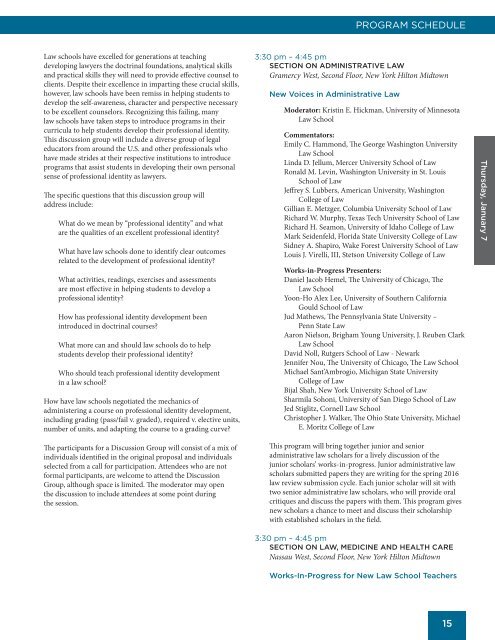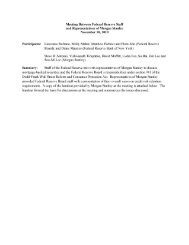You also want an ePaper? Increase the reach of your titles
YUMPU automatically turns print PDFs into web optimized ePapers that Google loves.
PROGRAM SCHEDULE<br />
Law schools have excelled for generations at teaching<br />
developing lawyers the doctrinal foundations, analytical skills<br />
and practical skills they will need to provide effective counsel to<br />
clients. Despite their excellence in imparting these crucial skills,<br />
however, law schools have been remiss in helping students to<br />
develop the self-awareness, character and perspective necessary<br />
to be excellent counselors. Recognizing this failing, many<br />
law schools have taken steps to introduce programs in their<br />
curricula to help students develop their professional identity.<br />
This discussion group will include a diverse group of legal<br />
educators from around the U.S. and other professionals who<br />
have made strides at their respective institutions to introduce<br />
programs that assist students in developing their own personal<br />
sense of professional identity as lawyers.<br />
The specific questions that this discussion group will<br />
address include:<br />
What do we mean by “professional identity” and what<br />
are the qualities of an excellent professional identity?<br />
What have law schools done to identify clear outcomes<br />
related to the development of professional identity?<br />
What activities, readings, exercises and assessments<br />
are most effective in helping students to develop a<br />
professional identity?<br />
How has professional identity development been<br />
introduced in doctrinal courses?<br />
What more can and should law schools do to help<br />
students develop their professional identity?<br />
Who should teach professional identity development<br />
in a law school?<br />
How have law schools negotiated the mechanics of<br />
administering a course on professional identity development,<br />
including grading (pass/fail v. graded), required v. elective units,<br />
number of units, and adapting the course to a grading curve?<br />
3:30 pm – 4:45 pm<br />
SECTION ON ADMINISTRATIVE LAW<br />
Gramercy West, Second Floor, New York Hilton Midtown<br />
New Voices in Administrative Law<br />
Moderator: Kristin E. Hickman, University of Minnesota<br />
Law School<br />
Commentators:<br />
Emily C. Hammond, The George Washington University<br />
Law School<br />
Linda D. Jellum, Mercer University School of Law<br />
Ronald M. Levin, Washington University in St. Louis<br />
School of Law<br />
Jeffrey S. Lubbers, American University, Washington<br />
College of Law<br />
Gillian E. Metzger, Columbia University School of Law<br />
Richard W. Murphy, Texas Tech University School of Law<br />
Richard H. Seamon, University of Idaho College of Law<br />
Mark Seidenfeld, Florida State University College of Law<br />
Sidney A. Shapiro, Wake Forest University School of Law<br />
Louis J. Virelli, III, Stetson University College of Law<br />
Works-in-Progress Presenters:<br />
Daniel Jacob Hemel, The University of Chicago, The<br />
Law School<br />
Yoon-Ho Alex Lee, University of Southern California<br />
Gould School of Law<br />
Jud Mathews, The Pennsylvania State University –<br />
Penn State Law<br />
Aaron Nielson, Brigham Young University, J. Reuben Clark<br />
Law School<br />
David Noll, Rutgers School of Law - Newark<br />
Jennifer Nou, The University of Chicago, The Law School<br />
Michael Sant’Ambrogio, Michigan State University<br />
College of Law<br />
Bijal Shah, New York University School of Law<br />
Sharmila Sohoni, University of San Diego School of Law<br />
Jed Stiglitz, Cornell Law School<br />
Christopher J. Walker, The Ohio State University, Michael<br />
E. Moritz College of Law<br />
Thursday, January 7<br />
The participants for a Discussion Group will consist of a mix of<br />
individuals identified in the original proposal and individuals<br />
selected from a call for participation. Attendees who are not<br />
formal participants, are welcome to attend the Discussion<br />
Group, although space is limited. The moderator may open<br />
the discussion to include attendees at some point during<br />
the session.<br />
This program will bring together junior and senior<br />
administrative law scholars for a lively discussion of the<br />
junior scholars’ works-in-progress. Junior administrative law<br />
scholars submitted papers they are writing for the spring 2016<br />
law review submission cycle. Each junior scholar will sit with<br />
two senior administrative law scholars, who will provide oral<br />
critiques and discuss the papers with them. This program gives<br />
new scholars a chance to meet and discuss their scholarship<br />
with established scholars in the field.<br />
3:30 pm – 4:45 pm<br />
SECTION ON LAW, MEDICINE AND HEALTH CARE<br />
Nassau West, Second Floor, New York Hilton Midtown<br />
Works-In-Progress for New Law School Teachers<br />
15



